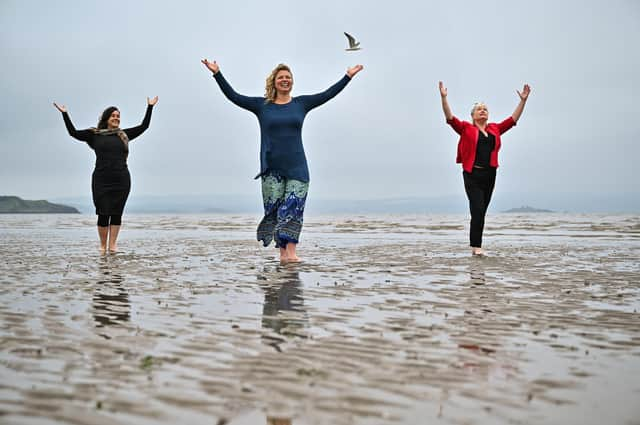Edinburgh Festival will help make sense of new realities and face the future with hope – Susan Deacon


Under a blue sky and beaming sun, the Festival City was slowly but surely coming back to life. The words ‘Welcome Back’, emblazoned on the side of a Lothian bus in the Edinburgh International Festival’s now familiar bright yellow and black colours, brought a smile to my face.
Local people were out and about – relaxing in the gardens, going into shops, making their way to work – albeit with masks and sanitising gel to hand. And there were visitors. Not the cacophony of languages and rich mix of nationalities of summers past, but real live tourists.
Advertisement
Hide AdAdvertisement
Hide AdOutside the National Galleries, families huddled happily around the Science Festival’s engineering exhibition and a queue was forming at the ice cream van. Signs of preparation for the summer festivals were dotted around the place and the doors of shops and cafes, closed for so long, were now flung wide.
It felt good. Not a return to the past, but the first tentative steps towards a new, if still uncertain, future for Scotland’s capital and for its festivals.
Edinburgh is an international city. A cultural capital. A place of ideas and learning. Its festivals are known and admired all over the world. Edinburgh’s long-held claim to being the world’s leading festival city is not overblown hype, it has been a statement of fact.
But it is something that can never be taken for granted and now needs to be re-asserted. Cities across the world are thinking afresh about how they adapt and recover and Edinburgh needs to stay on its toes.
City centres everywhere need to find new purpose and energy given changed living patterns. Scotland’s flagship festivals are a fantastic asset to make sure our capital remains a gathering point for people sharing experiences and ideas, at a time when working and shopping habits may be altered forever.
It is difficult to overstate just how impactful Edinburgh’s festivals have been over their 70-plus years, or how important they could be in the future – to the city, the country and the world. Lives and livelihoods; the arts and culture; human connection and understanding – at home and abroad – are all sustained and enriched by the festivals.
The festivals are a mainstay of the wider economy, a cornerstone of the country’s future prosperity, and a catalyst for tourism and talent across Scotland.
There are well-worn facts that are nevertheless worthy of repeating lest we forget the scale of the contribution: it’s estimated that more than 6,500 full-time equivalent jobs are dependent in the capital on our year-round festivals and the city benefits from at least £320 million in additional economic impact.
Advertisement
Hide AdAdvertisement
Hide AdWe should be truly proud that Scotland’s capital has, over generations, built and nurtured such world-class offerings and stay ambitious and hopeful for the future. The festivals have been so woven into the fabric of Edinburgh for so long that we forget at our peril what might happen if that thread is pulled.
Vibrant, energetic, informed and mature debate about Edinburgh and its festivals should always be encouraged. As should constant adaptation and innovation.
The unwelcome forced pause of the pandemic has, in some ways, been a catalyst for positive change. But we also need to remember that we are the custodians of one of the brightest jewels in Scotland’s crown and treasure it accordingly.
That Edinburgh and its festivals will look different beyond the pandemic is not in doubt. This year will not be a return to how things were, but, like in so many other fields of endeavour and employment, a bridge and a transition to a new, different, stronger and more sustainable future.
There have been silver linings in the dark Covid cloud that has hung over Edinburgh’s Festivals since last spring – better use of the city’s plentiful and beautiful outdoor spaces, the benefits of rapid digital acceleration, our collective reawakening to the importance of human connection, and a heightened awareness of the vulnerabilities and inequalities that abound in Edinburgh and beyond. These changes and more should be firmly embedded in future thinking and practice.
The need and the opportunity to work together to shape a new future for the Festival City has never been greater nor the stakes higher. Our festivals would never have got to where they are now without a wealth of collaborative effort, let alone have survived the last year.
So back to my walk through the city.
That sense of new beginnings was brought into even sharper focus when I reached my final destination – Edinburgh College of Art, the new home of this year’s Edinburgh International Book Festival.
After a year so bereft of human connection, it was strangely moving to know that just a few weeks from now the place would come alive with people, ideas and conversation.
Advertisement
Hide AdAdvertisement
Hide AdBut it is more than the location that will have changed. The past is a different country. The world has changed and so have we – probably in ways we don’t yet even realise.
So we need to view our festivals through a future lens, not a rear-view mirror. And in this strange uncharted territory, our festivals will help us in turn to make sense of our new realities and face the future with hope and understanding.
Susan Deacon is chair of the Festivals Forum
A message from the Editor:
Thank you for reading this article. We're more reliant on your support than ever as the shift in consumer habits brought about by coronavirus impacts our advertisers.
If you haven't already, please consider supporting our trusted, fact-checked journalism by taking out a digital subscription.
Comments
Want to join the conversation? Please or to comment on this article.
